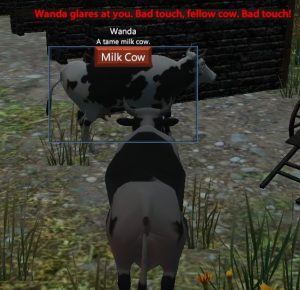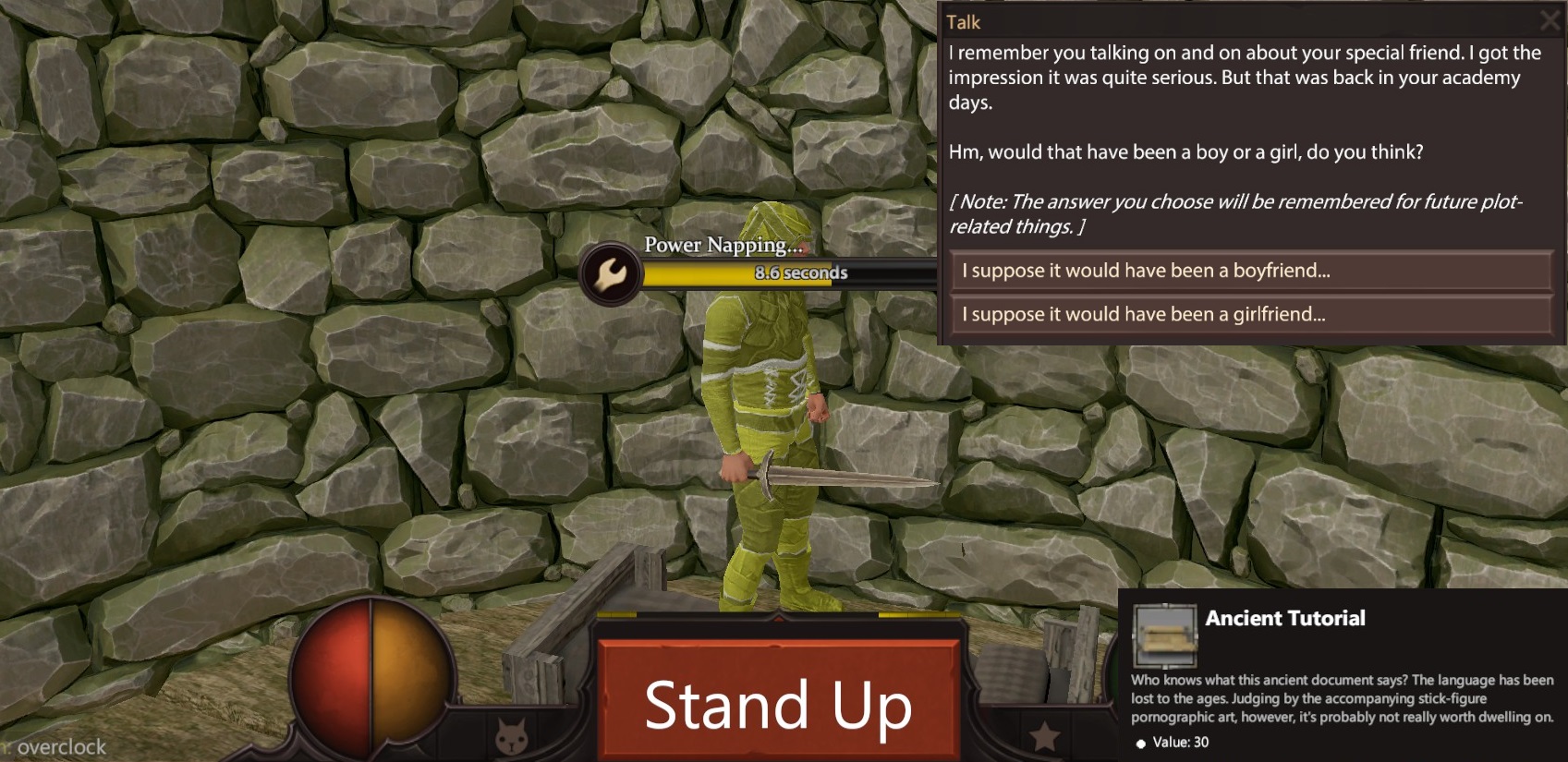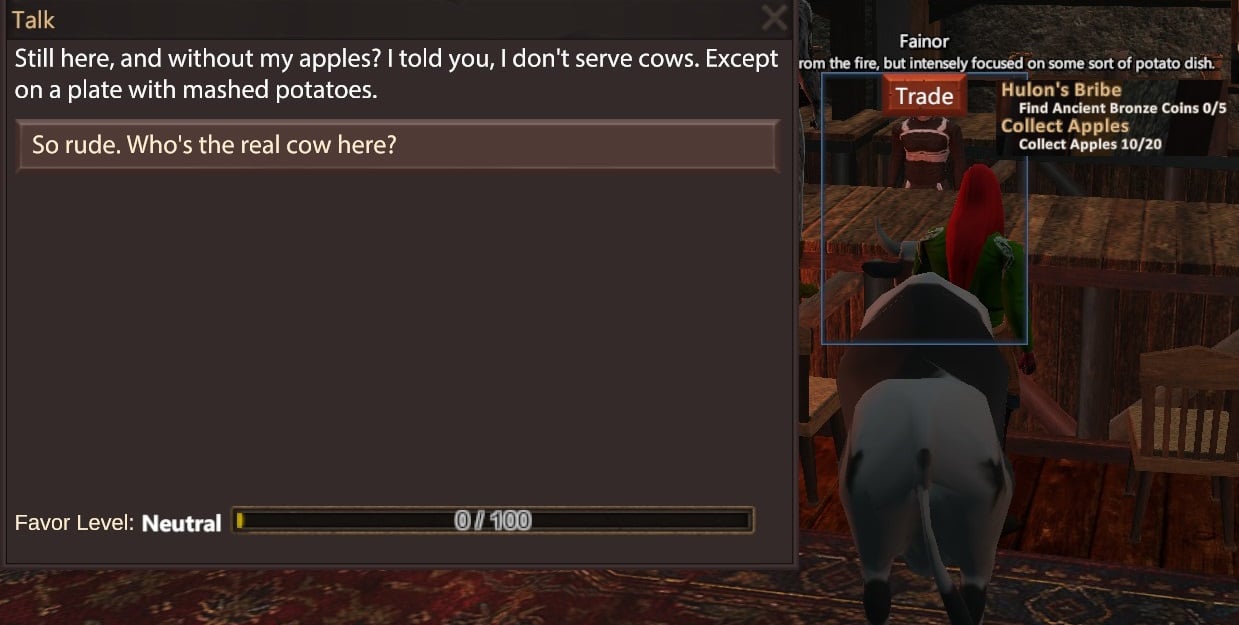
It’s finally time for me talk about Project Gorgon as a released product. As you might have guessed, I was avoiding the game prior to launch. I’ve spoken out against early access a lot and have realized that, at this point in my gaming/career, playing games I’m passionate too early can be a threat to both work and play. I wanted a relationship with PG, but I didn’t want to rush into anything pre-release. I wanted it as complete as possible.
MJ’s streamed it a bunch of times, including the day before launch. Eliot’s comments from his pre-release CMA feel spot on still post-release. However, as the resident old-man Asheron’s Call fan with a review copy, I think I can add a few comments about how Project Gorgon compares to AC1&2, plus how developer Eric Heimburg’s infused PG in AC-esque ways.
The bad
For those who might not realize this, I am terribly critical of things I like. Things I enjoy or are familiar with get the bluntest part of my critique bat, but it’s because I feel like I “get” them the best and want to see them grow. So keep that in mind, as I’m going to be quite harsh with Project Gorgon in a moment.
For Asheron’s Call players, don’t look at Project Gorgon as Asheron’s Call 3. Project Gorgon’s lore and storytelling is much more light-hearted, especially when you’re new to the game. The skeletons whine, our mentor is inept, abilities like “psychology” and “pathology” feel anachronistic, and our first (only?) major antagonist is more Gaerlan than Palacost.
Maybe it’s because I’m an adult, but the wordplay and names in Asheron’s Call (i.e., Acheron being the Greek river of woe in mythology) felt intentional. PG’s feels like it’s grasping. There might be a few, like “Anagoge” Island, the starter zone, but Elmetaph, a depressed man whose name maybe is a combination of the name Elme (supposedly the French form of Elmo, meaning “helmet”) and -taph from Greek meaning “tomb,” feels clumsy. There are others I’ll spare you from.
Character creation is almost non-existent. You essentially choose a race, gender, hairstyle, and colors. The faces all look the same to me, so your starter experience feels like you’re walking among clones, especially since you don’t pick any skills – you learn them upon arrival through various activities, and as the starter island only has a few of said skills, everyone looks and feels the same.
The UI feels archaic. Better than AC’s for sure, but due to the exploratory emphasis of the game, you have to click through a ton of menus to find quest objectives and hints, which will probably send most modern/World of Warcraft-era MMO fans running, especially when they discover that /dance is tied to a specific skill and not immediately available. Just clicking buttons that wiggle when you hover over them can be frustrating, not to mention lag causing your character to do a 180 if you navigate your character by holding the left mouse button to turn. That being said, I appreciate the shorter hotkey bars, skill limitations/”decks,” and multi-key input for various bars.
 While I can appreciate the exploratory nature of the game, someone logging in to work on earning Skill A but finding out they need to build reputation with NPC 1 to first learn Skill B may make the game feel unclear at best. It may hinder enjoyment for people who are looking for a specific experience or goal during their playtime. Roleplay-wise, it may also make things a bit difficult. For example, my AC swordsman was supposed to be illiterate, which was why he couldn’t learn magic well. PG has good swordsmen learning calligraphy, which clearly curtails that idea unless I also want my character to be poorer at his job (which, admittedly, is often what RPers have to settle with anyway).
While I can appreciate the exploratory nature of the game, someone logging in to work on earning Skill A but finding out they need to build reputation with NPC 1 to first learn Skill B may make the game feel unclear at best. It may hinder enjoyment for people who are looking for a specific experience or goal during their playtime. Roleplay-wise, it may also make things a bit difficult. For example, my AC swordsman was supposed to be illiterate, which was why he couldn’t learn magic well. PG has good swordsmen learning calligraphy, which clearly curtails that idea unless I also want my character to be poorer at his job (which, admittedly, is often what RPers have to settle with anyway).
Although the game tries to push exploration, it’s also held hostage by old design choices, like single-player loot and power levels. It’s supremely disappointing after games like The Elder Scrolls Online have made efforts to allow for more accessible/fluid “levels” that make exploration possible for newcomers and veterans alike.
Granted, there are no overt player levels in Project Gorgon, but skill levels do grant stat bonuses and the ability to wear gear that increase your survivability. These restrictions can be bypassed with help from guildies/friends/high levels, especially if they give a newbie certain gear or buffs, which increases the social aspects of the game. However, making those contacts can be difficult right off of the newbie island.
All of this ignores the visual and audio presentation. The graphics are rough. They’re barely better than AC1‘s visual upgrade patch. The sound is only vaguely better than AC since the latter lacked music. PG’s player-made music, though, is grating, to the point that I’ll flee areas or turn the sound off, which I haven’t done in years, and anyone spoiled by AAA games will immediately notice the lack of voice acting.
Generally speaking, I feel like that’s enough to damn most games. In fact, my first few minutes of the game were so rough I nearly called it quits. See, unlike my approach to most sandbox games, this time I didn’t go into PG fully prepared: I had barely any character design research, no guild, and no gaming friends. I know that’s common for many gamers, but as an MMO enthusiast, I feel like that’s the worst way to go into an MMO, especially a sandbox.
However, I found some things in PG that did end up tickling my AC nostalgia and more.
Asheron’s Legacy
With all that I said about the game, why would any, especially a crotchety old Asheron’s Call player, try Project Gorgon? For one, the skill customization. No, you can’t be a mage tank from day one, but you can work towards that. Or be a cheesemaking phrenologist by day and a bovine interpretive dancer by night. There are so many skills to discover and level up through use (not raising via experience points) that often, the hardest thing for me to do was stop exploring and actually focus on raising a couple of skills! You’re not bound by skill points or XP to spend, just time and knowledge of the game. It really feels like a system AC would have evolved.
The community is super friendly too. It’s far from perfect, and you’ll still meet people with names that make you wonder why a middle schooler is playing a retro-looking MMO, but they’re good people for the most part. Remember people parked at newbie towns to welcome newcomers? It happens in PG. Random highbies offering their used gear to new players? Happened to me several times in PG. Free booze at a player events? That happens too.
Random guilds invites? Didn’t happen. Being called a noob? Didn’t happen. Being told if the game’s too hard I should just quit? Well, didn’t happen to me, but I only saw it once, and it was during primetime in global chat, so it’s kind of to be expected.
It’s not uncommon for me to see an AC inspired name or even guild (yes, I joined one). Cheese covered in red wax, a drudge favorite, returns to PG. But there’s more. Some of the old commands, like /age still work. AC2 fans shouldn’t be surprised that one of the first quests involves tapping obelisks, but even non-AC vets can appreciate other retro MMO throwbacks: items being able to be dropped on the ground, the majority of the game’s items being tradeable, environmental interactables, puzzles without exclamation marks, temporary parties that you name instead of the bland random groups/raids we’re often put into when tackling instanced dungeons (no, PG’s dungeons aren’t instanced), and non-linear gameplay.
Yes, in Project Gorgon, there’s exploration and discovery. You probably could follow an optimal path to power leveling your OG mage in the old AC days, but something always happened. You’d find a key to a chest deeper in the dungeon than you might normally go and set off on chasing the “phat loot.” Maybe a Diamond Golem would spawn and you’d test out how good your template was with the other newbies in the area. Heck, maybe just running around town you’d find a rare spawn dye you could trade on your main.
Adventure always seemed to be right around the corner, and the same is true in Project Gorgon. Maybe there’s a new NPC giving out cow potions. Maybe it’s suddenly fishing season. Maybe you find a goblin’s business card and realize there’s a goblinese skill, go about figuring out how to skill up enough to use said business card, and get roadblocked by an NPC who requires you to take a bath before she talks to you.
Combined with the community, Project Gorgon seems to “get” what most MMOs these days don’t. Our genre isn’t about DPS meters and world firsts. It’s not about fixed-stat, best in slot items for us to chase. It’s not even about being the highest level. It’s about adventure, exploration, and discovering things with people. There’s no dungeon finder, no soloing instances, and no level cap. Project Gorgon’s not a sandbox built on the blood of your fellow player but a dance hall of the fun and weird, complete with their unique class combos, droppable drinks and dishes.
A cult sensation
Project Gorgon may be the MMO genre’s Earthbound. I don’t say that lightly either, as my love affair with the Earthbound series (“Mother” in Japan) is responsible for a lot of who I’ve become as both a gamer and person. In fact, in an odd way, it’s how I got into the original Asheron’s Call.
For those unfamiliar with Earthbound, just know the game was a cult classic JRPG that took RPG tropes like knights and random encounters and flipped them upside down, fusing them with a more modern (and humorous) setting. While Project Gorgon doesn’t take place in 201X, the original anachronisms I mentioned add to the game in ways I wasn’t anticipating. Commentary about the power of magic to fulfill the shortcomings of psychology is both unexpected and humorous, as are some of the responses of enemies that you psycholoanalyze for crowd control.
Like Earthbound, Gorgon plays with your expectations. A traditional MMO tells you to go kill 10 spiders. Project Gorgon then gives you the ability to ask why you need to kill those spiders and even a choice to tell the NPC you simply don’t care. While being asked to do these mundane tasks feels beneath me as a digital mass murderer often sitting through cutscenes describing in way-too-serious detail about how important it is to kill my bland targets, the off-beat meta humor makes it easier to accept.
NPCs don’t just stand around town. They walk. They interact with each other. They get mad if you kill their pets, and they’ll make fun of you and their fellow vendors. It’s something we’ve seen bits and pieces of in other MMOs, but it’s finely woven into Project Gorgon. It’s not one or two NPCs. It’s… common, normal even. It’s things that felt like they were possible in Asheron’s Call’s live events, but automated in ways that make the base of the game, rather than create unique moments you’ll miss if you log out.
It’s not all fun and games either. For example, there are very real racial tensions in the town of Eltibule that play out in front of you. Players who are turned into animals face very real “racism.” There are talks of deserved genocides, race rankings, minorities having to bribe officials to do their jobs, death threats, the fetishism of the “other”… this is what sci-fi and fantasy is supposed to be about! Not just raw escapism, but the tackling of difficult topics in a fictional world to make them easier to explore, whether it’s through a cult of people worshipping the color blue or a bank keeper asking a talking pig to secure some rare coins as a bribe.
Asheron’s Call saw some of this. Enemy races turned to allies, but for the most part, it was the story in front of us. We were at a safe distance to talk about it for a very long time, until said races became playable. Project Gorgon puts you in the minority shoes to experience life in a new way, and it’s not just “for fun.” Some of the rewards, like bonding with a suspicious cow, grant rewards that can be rare or impossible to get elsewhere. It does what good games should: let you experience something you normally wouldn’t, but from a safe distance. Killing is passé in games at this point. Being a giant spider that just wants to buy a drink but has to bribe the barkeep is new, uncomfortable, but also humorous. A good summary of what Project Gorgon is at its best.
The Project is real
Make no mistake: Project Gorgon is not going to turn a lot of heads, especially for post-WoW MMO fans. “Project” is very fitting, as the package itself is very rough, as are some of the mechanics. There’s still an old-school grind, puzzles that require you to write stuff down (though there’s an in-game notebook), and a real need to work on your cartography skills. While it does try to guide players a bit, the exploratory nature of PG and the genre will make it a hard pass for anyone who doesn’t already enjoy sandbox games.
That being said, there’s an audience for the game. I can highly recommend the game to any Asheron’s Call veteran that is looking for a specific MMO feel, rather than just the AC lore, especially if they can get onboard an MMO that can comment on the state of MMOs.
Project Gorgon innovates and revives core staples of the genre that AAA companies don’t get, and that’s before adding in a few of its own. Boss curses inspire fear and fun, rewards for doing something new push people to move out of their comfort zones, and the lack of instancing makes it harder to escape digital society. Off the top of my head, I haven’t seen an MMO that inspire this kind of immersion since The Elder Scrolls Online’s initial demo. If Heimburg had a bigger budget, an established IP, and a larger team, I’d wager his game would pose a very real threat to the current market. As it stands, it’ll just delight the small contingent of discerning old-school MMORPG explorers who stumble into it.


















